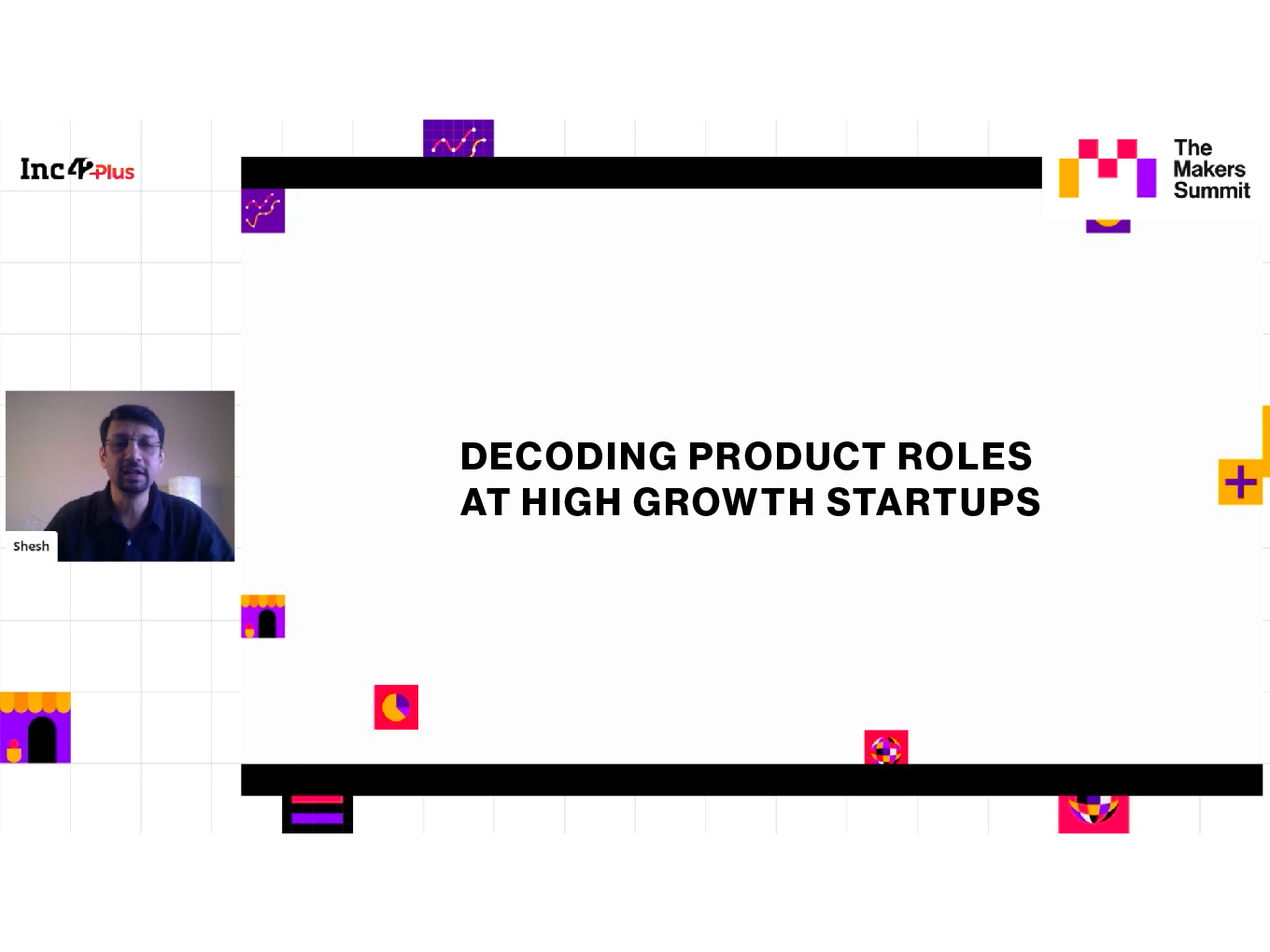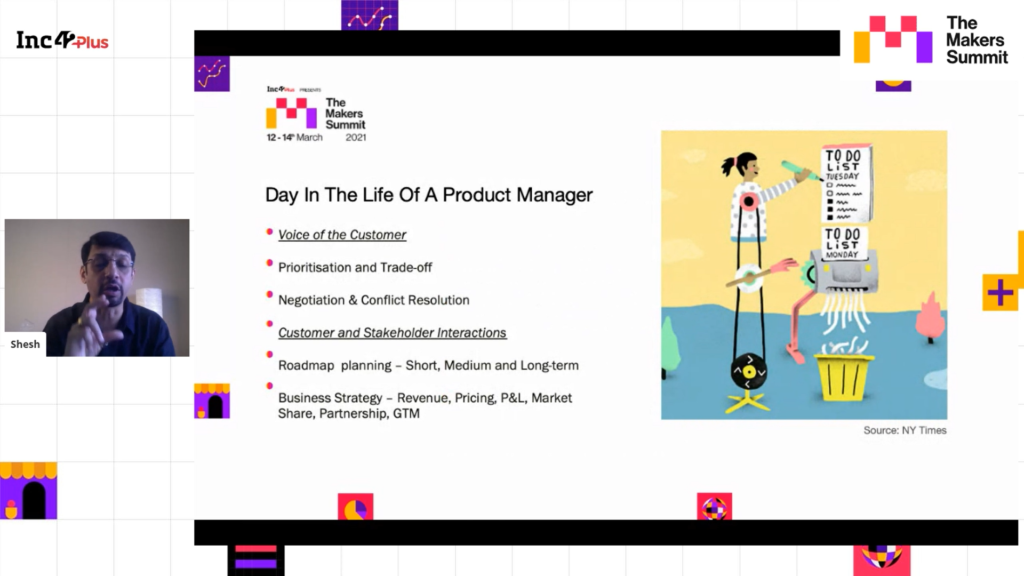
In the first session of The Maker Circle, a series of masterclasses by veteran product leaders hosted by Inc42 Plus as a prelude to The Maker Summit 2021, renowned product leader and mentor Shesh Vasudevamurthy shared his understanding of the dynamic nature of products and the strategies needed by product managers to excel in a technology-driven development space.
Speaking about his 21-year-long journey in the world of product management, Vasudevamurthy walked the audience through the evolving role of a product manager.
“Back in the 90s, India was a nascent ecosystem, but it has matured rapidly in the past eight years. Now that a lot of startups and unicorns with a global presence are emerging from India, we are in a position to bring the next great product onto the world stage,” he affirmed.
Here are the key takeaways from Vasudevamurthy’s masterclass session.
Think Like A Product Manager
A product manager’s role has to be dynamic with several layers to it. But the most important thing to excel in this role is understanding how your team contributes to creating a successful product. A product manager has to sift through various tasks, including designing, analysis, development and marketing, and needs to understand the role of each function. Vasudevamurthy further highlighted the everyday nitty-gritty that would add up to create value in the product journey.
The most crucial component is, of course, design, and the continually changing dimensions of user experience based on it, said the industry veteran. “Designing is all about looking at the product from the customer’s point of view. The customer doesn’t care about the technology or thousands of lines of coding. He only cares about how the product can make his life simpler,” he explained. Vasudevamurthy also emphasised that a designer’s role in product management is to hide away the design complexities and present a simple product that would enrich the user.
Continuing with the analysis, he stressed the difference between a business analyst and a product analyst. According to Vasudevamurthy, a product analyst needs to be well-versed in the product to be able to understand its impact on the market and an individual. On the other hand, a business analyst looks at the broad business vision that the product is expected to fulfil.
On the marketing front, there is a similar distinction between traditional marketing and product marketing. The main USP of product marketing is communication. “But you don’t just communicate. You communicate your understanding of the product, its benefits and how the features are implemented. All these must be done with simplicity so that you can explain it to non-technical people. You have to understand how to abstract things, package and message it, keeping in mind the customer’s perspective,” he added.
Register For The Makers Summit
The Dynamic Role Of A Product Manager

Elaborating on the difference between a product manager and a product owner, Vasudevamurthy said that a product manager would always align things with the customer’s perspective, but a product owner must be able to understand the customer side and the technology side of things. Moreover, based on the requirements of a startup, its product manager can either be technical and hands-on with engineers or may align with the business side of things where he prepares a vision and lets the tech team work on it.
Delving into the challenges a product manager has to face, Vasudevamurthy said that the most crucial and tough task is to give the customer a voice. The customer stays at the pinnacle of the entire product operation. But the challenge comes in when a startup faces several limitations in terms of resources, licences and funding. (All these may hamper optimal customer experience.) So, there are always choices and decisions to be made. Prioritisation and trade-offs based on the said priorities could be another key challenge for a product manager. And dealing with these challenges comprise the majority of a product manager’s work.
Vasudevamurthy also emphasised the ability of a product manager to resolve conflicts and successfully negotiate with his team or multiple teams to initiate the correct escalation mechanism and ensure the highest efficiency.
Responding to a question from the audience, the product veteran explained how the role of a product head in an early-stage startup changes when a company enters the high growth stage. The product head in an early-stage startup functions across the entire operational framework and deals with all the features and implementations from top to bottom. But in a high-growth startup, a product head focusses more on leading the teams which work on individual features of the product. In this case, a product manager’s role involves vision and organisation rather than execution.
In today’s world, each market has specific needs which are getting bigger. So, it is difficult for a single product with fixed features to penetrate each and every global market. Every market requires particular products and features and business policies which will be in sync with the customers of that region. Stressing that point, Vasudevamurthy explained how the senior management of every business is now leaning towards atomic teams for particular locations. So, a product manager could be given complete charge of a team working in a local market and the team could focus on developing products which are most suitable for that market.
Growing Responsibilities Of A Product Manager

When quizzed about the conflict between tactics and strategy, Vasudevamurthy said that in the long run, strategy would be the priority. He defined strategy as the overarching vision of the product in terms of the impact it creates. In contrast, tactics are focussed on daily problems and their resolution. He also cautioned the audience that it is easy to get sucked into day-to-day tactical tasks, but only strategy can give direction to those tasks.
On the same note, he insisted that keeping an eye on the big picture is the best way to go ahead. Using the metaphor of ‘the tree and the forest’, Vasudevamurthy said while working on the tree, it is sometimes necessary to zoom out and look at how the tree is shaping the forest.
Responding to another question from the audience, he talked about the skills to look for in a product manager. Although it depends on founders’ expertise — product managers should complement the former’s knowledge and skills — thinking outside the box and the appetite to learn should be the necessary skills.
At the end of the insightful and engaging session, Vasudevamurthy said he was extremely fond of the role (of a product manager) and hoped that the session would help people who love to build great products. The vision should be making more products which have not been developed yet and build them for many Indian markets and then expand globally.
It was the first session in a series of 10 masterclasses acting as a precursor to the The Makers Summit in March. Keep watching this place for our next session.
Register For The Makers Summit
The post Former Amazon And Walmart Product Leader Decodes The Role Products Play And The Product Manager’s Psyche appeared first on Inc42 Media.
0 Comments